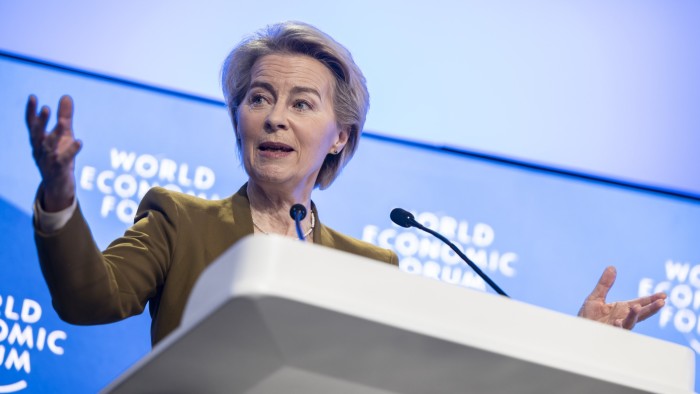Stay informed with free updates
Simply sign up to the EU trade myFT Digest — delivered directly to your inbox.
Brussels wants to allow governments to exclude foreign bidders and “buy European” in a move echoing Donald Trump’s “America First” policy that could break international agreements with trading partners.
The European Commission “will propose the introduction of a European preference in public procurement for critical sectors and technologies”, according to a draft plan obtained by the Financial Times.
Officials say the aim is to give governments a way to protect important EU sectors from cheaper competitors from China and elsewhere. The proposal, which aims to implement reforms championed by Italy’s former prime minister Mario Draghi, is still under discussion and could change before it is published on Wednesday, they said.
“Buy European” provisions, which could hit the UK and Switzerland, have long been debated in Brussels but have struggled to win support from economically liberal member states. The latest initiative comes as the US president directs his administration to prioritise domestic purchases.
“The loss of European-based production capacities and knowhow in critical sectors could leave the EU dangerously dependent on imports in key segments of the economy,” the proposal says.
“In a context where other major players impose access restrictions to their markets and seek to boost manufacturing capacity in critical technologies, Europe must safeguard its own capacities.”
Stéphane Séjourné, the French EU commissioner for industrial strategy, has said that measures such as the revision of public procurement and state aid rules are part of Brussels’ effort to “translate the European doctrine into action”.
The commission wants to revise the public procurement directive next year, which dictates that all contracts “must treat all applicants equally and not discriminate between them”.
The EU is also a signatory to the government procurement agreement at the World Trade Organization, which states that measures “should not be prepared, adopted or applied so as to afford protection to domestic suppliers, goods or services, or to discriminate among foreign suppliers, goods or services”.
If approved by member states, the Europe first policy would be a remarkable volte face. It threatened action against China this month for unfair discrimination against EU companies in the medical device market.
The bloc in 2022 launched a legal case against the UK at the WTO when it consulted on giving preferential access to domestically manufactured wind turbines in subsidy schemes.
“This violates the WTO’s core tenet that imports must be able to compete on an equal footing with domestic products,” the commission said at the time. London backed down.
Lawyers said that the bloc would be open to challenge both internationally and at its own European Court of Justice. “The EU will need to think carefully about compatibility with WTO and the EU’s own rules,” said Francesco Pili, counsel at Hogan Lovells in Brussels.
If the proposal survived it would signal a victory for France, which has led calls to go further with “strategic autonomy” including favouring local companies.
The leaked “Competitiveness Compass” document proposes to cut the administrative burden on EU businesses by 25 to 35 per cent, as previously announced. But it sets no baseline for the calculation.
But it also outlines almost 40 new acts, action plans and sectoral strategies.
Among them are a Biotech Act, a Space Act, a Critical Medicines Act and a Chemicals Industry Package, as well as measures to streamline the EU’s disparate national tax and labour laws.
All aim to boost EU research or protect domestic businesses.
“In a global system where geopolitical tensions, competition for technological supremacy and the scramble for control over resources are on the rise, Europe’s freedom, security and autonomy depend more than ever on its ability to innovate, compete and grow,” the paper says.
The commission said it could not comment on draft proposals.
Read the full article here




